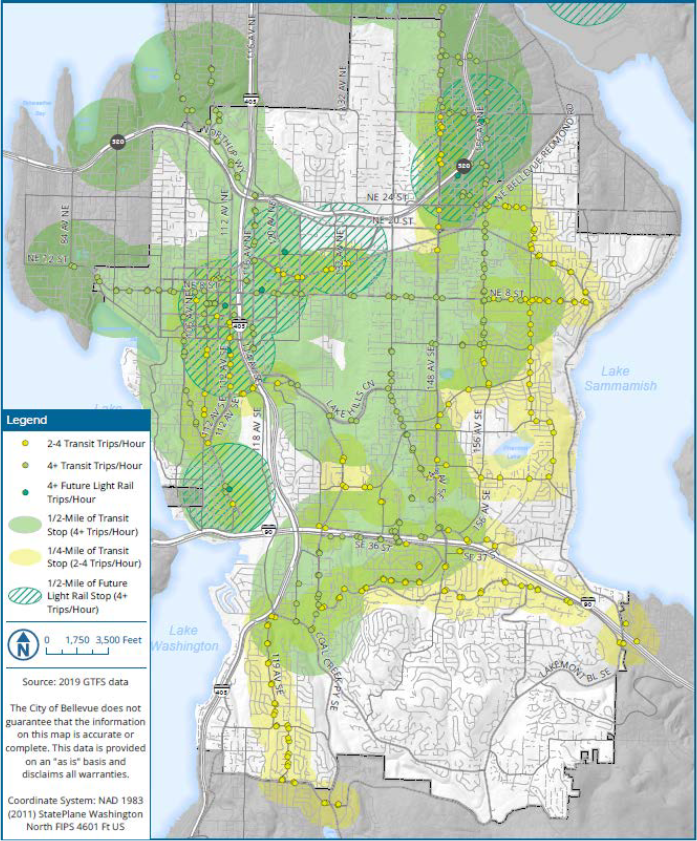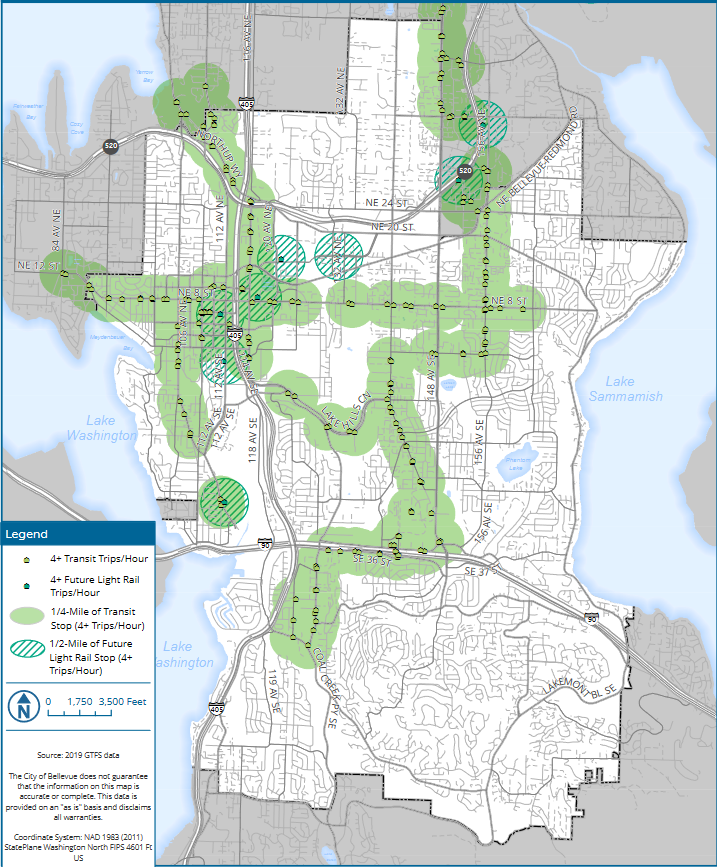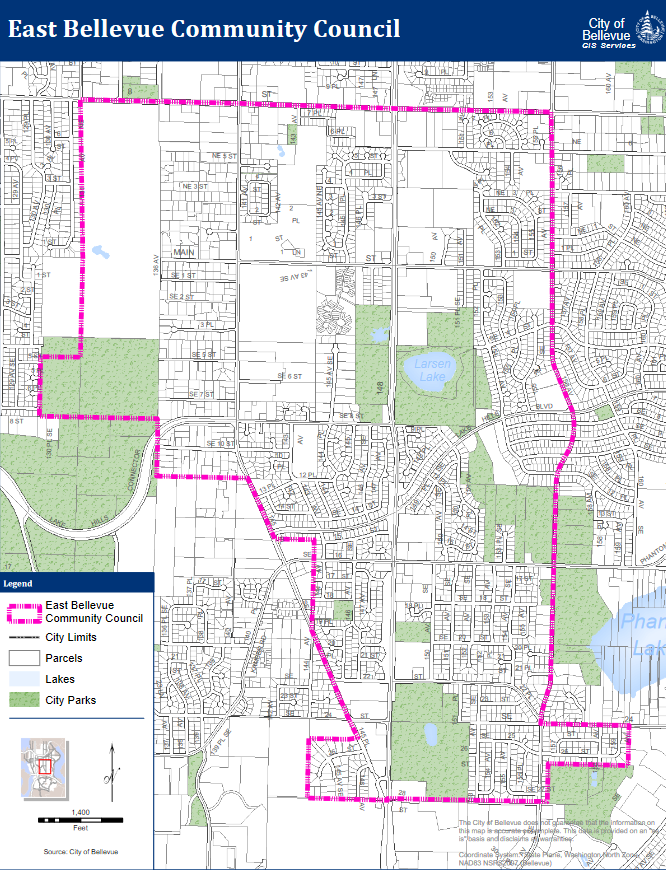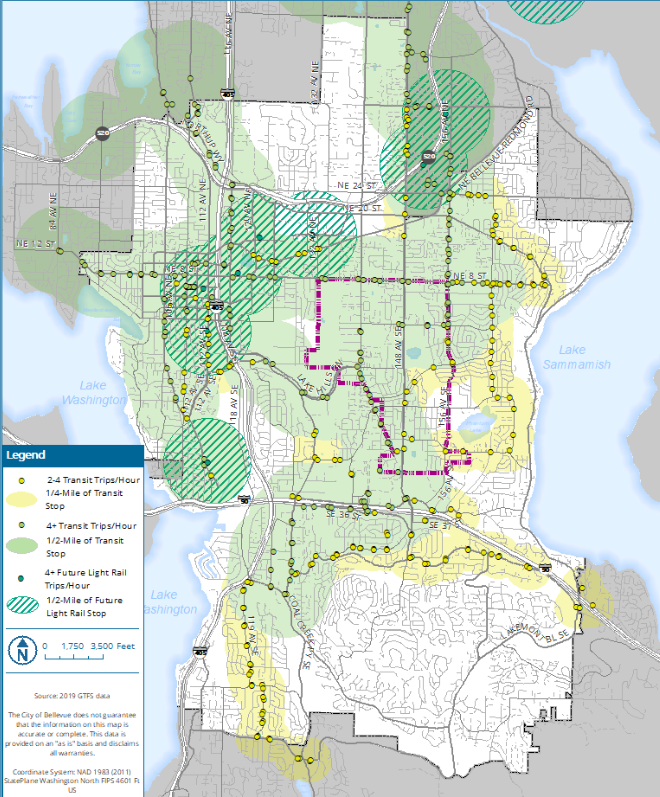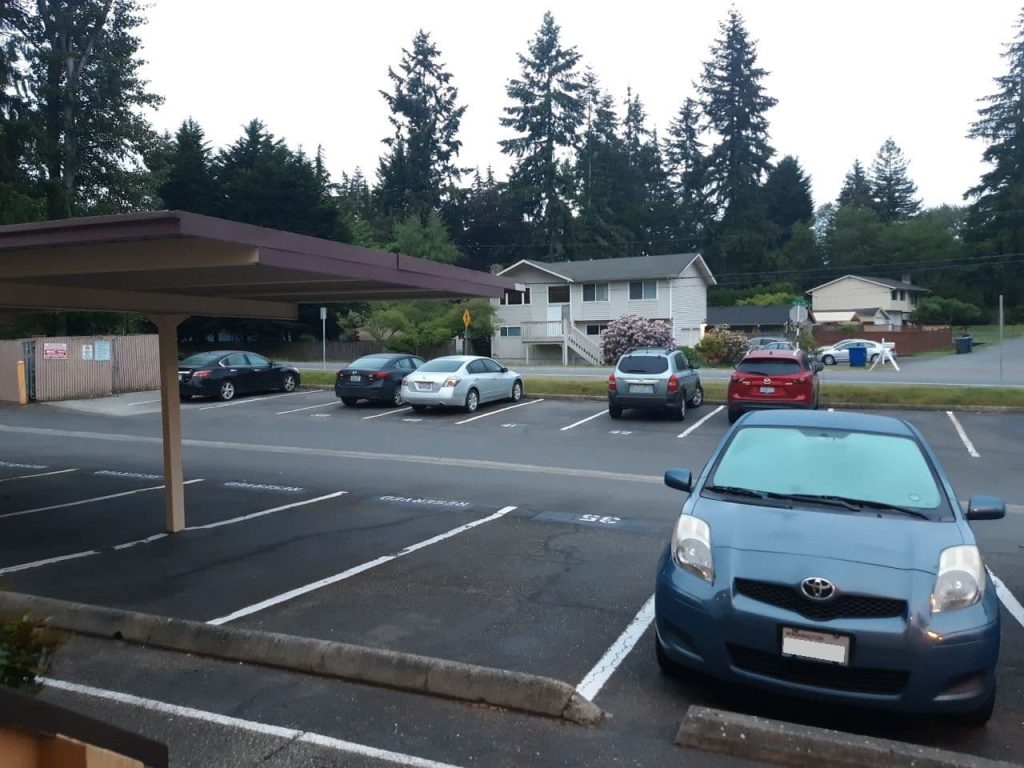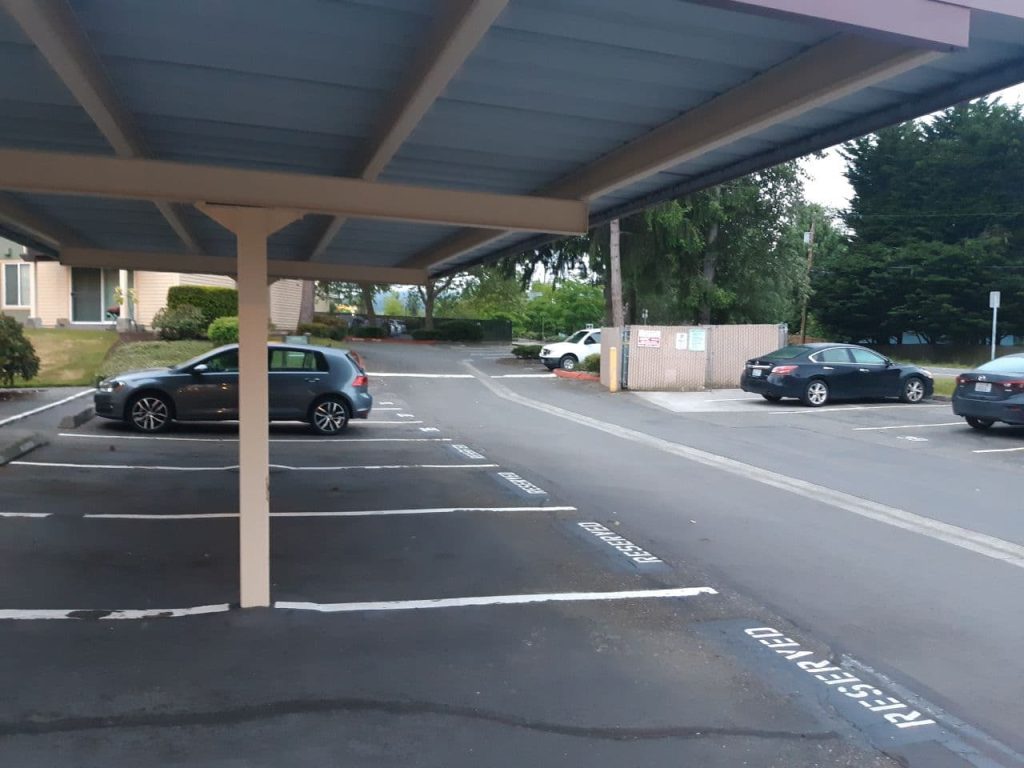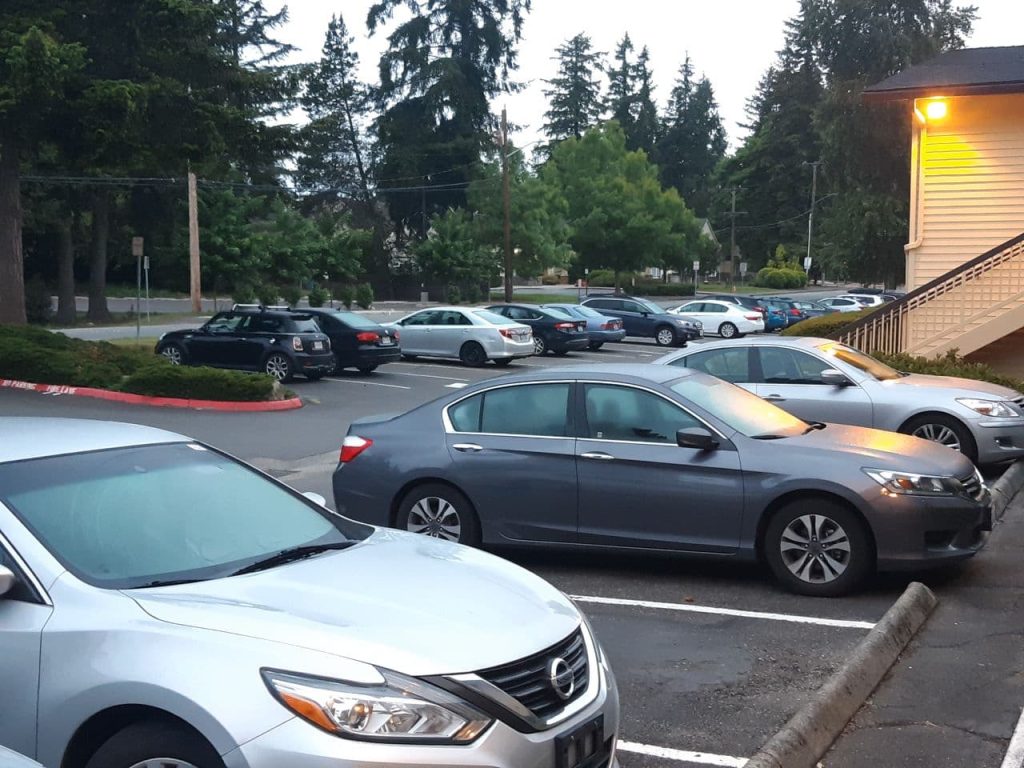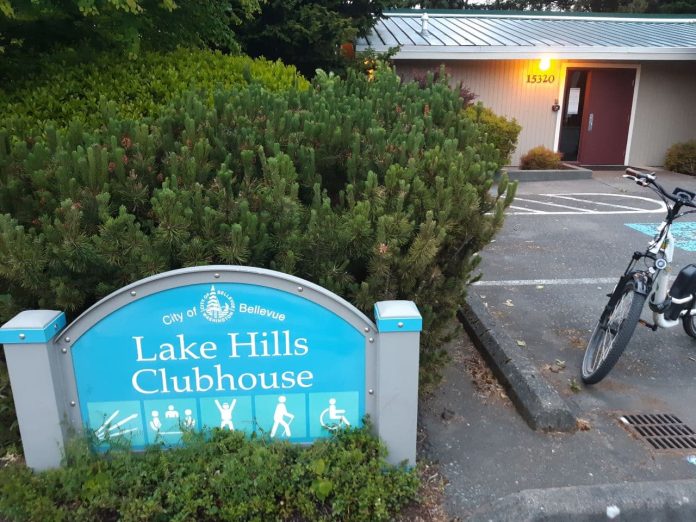
The move embroiled the City of Bellevue in a costly legal fight. Already on the hook for $40,000 in legal fees, the City could be in for much more as the battle against a state mandate to loosen parking requirements near frequent transit drags on.
Although it may not have been subject to much fanfare, the outcome of Bellevue’s City Council meeting on Monday, April 26th represents the culmination of months of work, itself predicated on state legislative action from over a year ago. With its unanimous approval of Ordinance 6575, City Council passed substantive reforms to parking minimums for new affordable housing, multifamily developments, and accessory dwelling units (ADUs) near frequent transit stops. Because parking can comprise a significant portion of project costs, requiring less legally-mandated parking can be a small way to encourage the further development that will be required to address Bellevue’s burgeoning affordability crisis.
The approved Land Use Code Amendment (LUCA) stipulates different parking minimums depending on a development’s distance to transit stops, frequency of service at those stops, and the type of development being planned. Because the overlapping conditions can be confusing (both for the public and for planning commissioners during the LUCA approval process), here’s a brief summary of the important outcomes:
- New affordable housing units a) up to 80% of Area Median Income (AMI) b) located within one quarter-mile of transit that operates 2-4 times per hour = 0.75 parking spaces/unit.
- New affordable housing units a) up to 80% AMI b) located within one half-mile of transit that operates more than 4 times per hour = 0.5 spaces/unit. Units at 60% AMI or lower with the same transit conditions will only require 0.25 spaces/unit.
- New market-rate multifamily developments located within one half-mile of transit that operates more than 4 times per hour = 0.75 spaces/unit.
- New senior housing units within one half-mile of transit that operates more than 4 times per hour do not require parking for residents.
- New ADUs within one quarter-mile of transit that operates more than 4 times per hour do not require an off-street parking space.
- As staff emphasized to concerned community members and commissioners numerous times during the process, these regulations are mere minimums. Developers can still choose to build more parking if they believe it benefits the project.
Bellevue’s scramble to comply with state law
Transit usage has been rebounding as we reach the end of the Covid pandemic, and Bellevue will be a major recipient of several system expansions in the near future (which have smartly been incorporated in this LUCA). This ordinance was therefore timely and received support from a wide coalition of housing advocates, developers, and members of the business community — but the city does not deserve all the credit. The foundations (and in fact the legal requirement) for this ordinance were laid by the State Legislature’s passing of Rep. Joe Fitzgibbon’s HB 2343 in 2020, which required cities planning under the Growth Management Act (GMA) to adopt lower parking minimums near transit.
To temporarily comply with the law, Bellevue passed an IOC (Interim Official Control, effectively a stopgap measure while staff and commissioners worked on a permanent ordinance) in May 2020 that was extended through May 18th, 2021, giving the city a hard deadline to pass the resolution before Bellevue would run afoul of state law. Luckily, Council was able to avert a legal crisis by passing the ordinance (which actually went beyond the state-mandated minimums) with weeks to spare.
A resounding success story in local governance, were it not for the East Bellevue Community Council (EBCC) throwing a wrench in the whole process and placing its jurisdiction in potential legal jeopardy.
At its May 4th meeting, the EBCC rejected the parking reforms in a 3-2 vote, meaning that the LUCA will not apply within its jurisdiction. The EBCC is one of two remaining community councils in Washington State — entities created during annexations that give local communities veto power over land use decisions within their borders. Although purported to be about preserving local autonomy, in practice these councils add additional red tape and bureaucratic hurdles to new developments and provide opportunities for community members to reject implementation of important affordable housing strategies. This is certainly not the first time a land use decision unanimously approved by the City Council has been vetoed by the EBCC, and so long as the body exists it likely won’t be the last.
“I think that everyone has the right to own a car or cars. This [ordinance] makes it more of a burden.”
EBBC Vice Chair Ron Epstein
However, what’s unique about this decision is that, with the expiration of the city’s IOC on Tuesday, the EBCC’s jurisdiction is now in violation of state law. I reached out to the City of Bellevue for confirmation, and they do not recall a time where specifically East Bellevue was in violation of a state land use law that the rest of the city was in full compliance with.
This uncharted legal territory comes with a significant cost; because the EBCC is a distinct legal entity that now exists in a conflict of interest with the city itself, it cannot be represented by the City Attorney in this matter. After a lengthy, closed-door executive session at the start of Monday’s City Council meeting, the body approved expenditure of $40,000 from the city’s general fund to finance the EBCC’s legal fees via Resolution 9943. This resolution was neither on the meeting’s original published agenda nor included in the city’s news summary of the evening’s proceedings.
EBCC stokes unfounded parking shortage fears
I am not a lawyer nor a legal analyst, so I’m honestly not sure what the next steps will be for the City and the EBCC. However, I’m luckily not the only one — in its response to my questions, the City was unable to provide many details beyond the name of the hired legal counsel (Ogden Murphy Wallace). It is supposedly now the responsibility of this outside legal counsel to work with the EBCC directly on the matter, but the next steps and outcomes of any potential legal action (including any potential legal penalties levied against the EBCC) remain unclear.
“Who among us doesn’t own a car? We have three at my house.”
EBCC Councilmember Ross Gooding
Less mysterious, luckily, are the reasons the body voted against the LUCA — even if they’re unlikely to hold up as a valid legal justification to defy state law. Vice Chair Ron Epstein did not see a clear relationship between transit frequency and usage, a correlation that is easily understandable with the most basic research: “I think that everyone has the right to own a car or cars. This [ordinance] makes it more of a burden.”
Councilmember Ross Gooding believed that the ordinance would force more cars onto the street: “Who among us doesn’t own a car? We have three at my house.” In justification for her “no” vote, Chair Betsi Hummer not only explained her (incorrect) belief that having the LUCA apply in the high-transit neighborhoods of Downtown, Bel-Red, and Eastgate would be legally sufficient, but also cited apartment complexes near Bellevue College with full parking lots as proof that these reduced parking minimums would negatively impact residents of multifamily and affordable housing.
As an actual resident of one of these complexes, I have absolutely no idea what full parking lots she is seeing or talking about — making me believe this is just another bad-faith argument from a homeowner who can neither fathom that transit-dependent residents exist nor is interested in sincerely addressing the very real affordability crisis our city is facing.
These justifications, made by people who will never understand the experiences of people living in multifamily or affordable housing but who claim to speak for them, sidestep the costly impediments that inaction poses towards completing our city’s Affordable Housing Strategy. This decision, based on the fears of three residents in a municipality of nearly 150,000 will not only waste tens of thousands of city taxpayer dollars — it wastes precious time trying to accomplish what should be only a small part of a larger, comprehensive toolkit to improve affordability.
Although in the minority, there are luckily some voices on the EBCC who recognize this. Councilmember Steve Kasner noted, “We have dealt with controversial issues throughout the years. This is not one of them.” Councilmember Hassan Dhananjaya rightly pointed out the importance of looking to the future growth of the city, Lake Hills neighborhood, and Metro transit service when reaching a decision — aspects evidently not accounted for (or perhaps desired) by the Council’s majority.
Whatever the intentions or legal justifications, the EBCC may now find itself in an existentially precarious position. Residents in a Community Council’s jurisdiction decide every four years whether or not the entity should continue. The EBCC has survived nearly every vote with healthy margins, but it has come close to being dissolved in the past. In 2001, the body rejected a popular expansion of the Lake Hills Shopping Center, leading to a campaign that oversaw the demise of the neighboring Sammamish Community Council and near-death of the EBCC. Perhaps with this costly decision, sentiment for the EBCC will sour once more this November and the death knell of this vestige of NIMBYism will finally toll. For now though, the body has succeeded yet again in its sole purpose — vetoing decisions that could prove Bellevue actually lives up to its vision of “welcoming the world.“
Chris Randels is the founder and director of Complete Streets Bellevue, an advocacy organization looking to make it easier for people to get around Bellevue without a car. Chris lived in the Lake Hills neighborhood for nearly a decade and cares about reducing emissions and improving safety in the Eastside's largest city.

